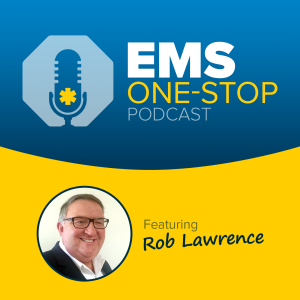
Thursday May 11, 2023
Not just for physicians: Quality improvement and safety
This episode of EMS One-Stop With Rob Lawrence is brought to you by Lexipol, the experts in policy, training, wellness support and grants assistance for first responders and government leaders. To learn more, visit lexipol.com.
In this edition of the EMS One-Stop podcast, Host Rob Lawrence speaks with Dr. Maia Dorsett and Paramedic Nikki Little to discuss the NAEMSP Quality Improvement and Safety Course, an exciting year-long course that provides EMS physicians and quality improvement leaders with the knowledge and skills necessary to lead QI and patient safety initiatives in their region, system or agency. Participants will develop an in-depth understanding of how to apply QI tools and strategies to their local needs to affect the care of patients.
Dr. Dorsett and Little identify that the program will take participants on a journey to improve the quality of care and safety in their system through a multi-modal approach in sessions led by expert faculty, who will discuss key aspects of quality improvement.
TOP QUOTES FROM THIS EPISODE
“I think one of the things I love about this course is half the faculty are not physicians. There is a fair percentage of NAEMSP membership that are not physicians and the quality course especially is very deliberate. It has faculty from different backgrounds.” — Dr. Dorsett
“Your system is complex; all of the policies and procedures and processes that you have set up for the folks to work in them, they don’t always work as designed.” — Nikki Little
“Once a month, and even more often than that, because you meet with your mentees, you get to really collaborate idea-wise and work together with a group of people who are all there committed to making improvements in their system.” — Dr. Dorsett
“So many quality leaders are still stuck in this in this moment, where they’re looking at 50% in May and 52% in June, and we’re just comparing these two numbers and making massive strategic decisions about things that might be seasonal or have abnormal variation and we could be really making some really dumb mistakes if we’re not looking at our data over time.” — Nikki Little
EPISODE CONTENTS
02:00 – Introduction – Nikki Little
2:25 – Introduction – Dr. Maia Dorsett
02:40 – Description of the course
03:30 – Quality Course origin story
05:30 – Little’s experience as an inaugural participant
0745 – Month-by-month syllabus
10:00 – PDSAs and brevity in QI
13:00 – Capstone and results presentation
15:20 – Little’s course highlights
17:29 – Dorsett’s course highlights
21:25 – This course is not just for physicians
23:10 – Course overall timeline
24:30 – Cohort presentations at the annual meeting and poster presentations
26:20 – Class sign-up details
ADDITIONAL RESOURCES ON THIS TOPIC
NAEMSP Year-Long Quality Improvement and Safety Course
ABOUT OUR GUESTS
Maia Dorsett, MD, PhD, is an emergency medicine and EMS physician and educator. She completed her EMS fellowship at Washington University before moving to Rochester, New York, where she now serves as the medical director for EMS education at Monroe Community College and is the associate regional medical director for education and quality for the Monroe-Livingston Region. She is also the medical director for Gates Volunteer Ambulance as well as Prodigy EMS. Nationally, she serves on the board of the National Association of EMS Physicians and the National Registry of EMTs. She is involved in quality improvement implementation and education, serving as the co-course director for the NAEMSP Quality and Safety course.
Nikki Little, FAEMS, has fulfilled many roles as a paramedic, including advanced care paramedic, district chief of paramedic operations, 911 communication supervisor, and quality and patient safety officer in almost 30 years in EMS. She has a passion for patient-centered quality improvement of systems and has advocated for policy advances in the areas of patient safety, team communication and opioid overdose. She has dedicated countless hours to improve the quality and safety of patients with non-transport dispositions, (especially elderly and at-risk persons) and to improve the care for patients experiencing acute coronary syndromes (with particular focus on gender disparities in care). She has also contributed through committee work by way of the Paramedic Chiefs of Canada and the Manitoba Chapter of the Canadian Women’s Heart Health Alliance. In the area of quality improvement and paramedic education, she is in her sixth year as faculty of the National Association of EMS Physicians (NAEMSP) Quality and Safety Year-Long capstone course and preconference workshop. Her dedication to furthering the educational mission of the organization, and skill in teaching patient safety and improvement science to paramedic professionals and EMS physicians was duly recognized when she was named co-director.
CONNECT WITH OUR GUESTS